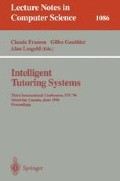Abstract
We propose a domain independent framework for computer based instruction systems capable of generating custom courses. A salient property of our framework is that the corpus content, pedagogical course structure, and course delivery are independent. The system does not use a student model. We believe that the student is the best model of himself and provide him with the power to dynamically change the course's delivery.
Preview
Unable to display preview. Download preview PDF.
References
Bloom, B.: Bloom taxonomy of Educational Objectives: Book 1. Cognitive Domain. Longmans Green, New York, (1956).
Chandler, T.: The Science Education Advisor: Applying a User Centered Design Approach to the Development of an Interactive Case-Based Advising System. Journal of Artificial Intelligence in Education, 5:3, (1994), 283–318.
Huang, X., McCalla, G., Greer, J. and Neufeld, E.: Revising deductive knowledge and stereo-typical knowledge in a student model. User Modeling and User-Adapted Interaction, 1, (1991), 87–115.
Kono, Y., Ikeda, M. and Mizoguchi, R.: THEMIS: A Nonmonotonic Inductive Student Modeling System. Journal of Artificial Intelligence in Education, 5:3, (1994), 371–413.
Kowalski, R.: Algorithm = logic + control. Communications of the ACM, 22 (1979), 424–431.
Schank, R.C.: AI, Multimedia, and Education. IJCAI-93, (1993), 1667–1672.
Winograd, T.: Frame Representations and the Declarative/Procedural Controversy. Readings in Knowledge Representation, R. Brachman and H. Levesque (Eds), (1985), 357–370.
Author information
Authors and Affiliations
Editor information
Rights and permissions
Copyright information
© 1996 Springer-Verlag Berlin Heidelberg
About this paper
Cite this paper
Gagné, D., Trudel, A. (1996). A highly flexible student driven architecture for computer based instruction. In: Frasson, C., Gauthier, G., Lesgold, A. (eds) Intelligent Tutoring Systems. ITS 1996. Lecture Notes in Computer Science, vol 1086. Springer, Berlin, Heidelberg. https://doi.org/10.1007/3-540-61327-7_102
Download citation
DOI: https://doi.org/10.1007/3-540-61327-7_102
Published:
Publisher Name: Springer, Berlin, Heidelberg
Print ISBN: 978-3-540-61327-5
Online ISBN: 978-3-540-68460-2
eBook Packages: Springer Book Archive

